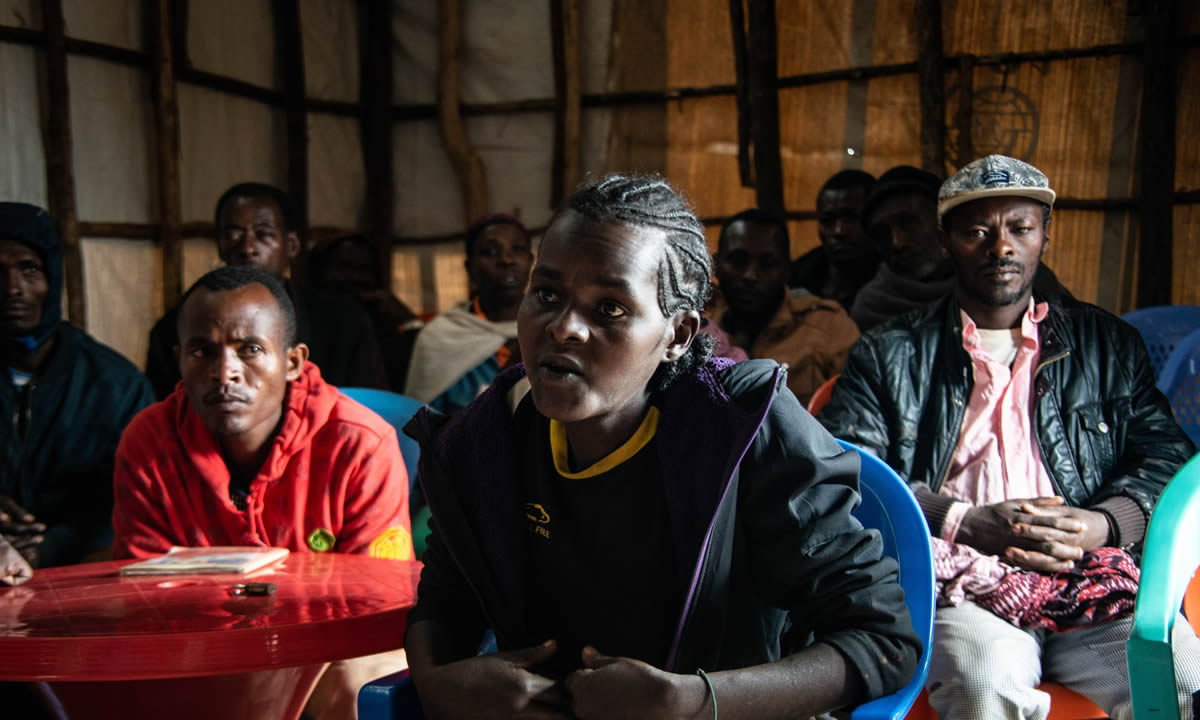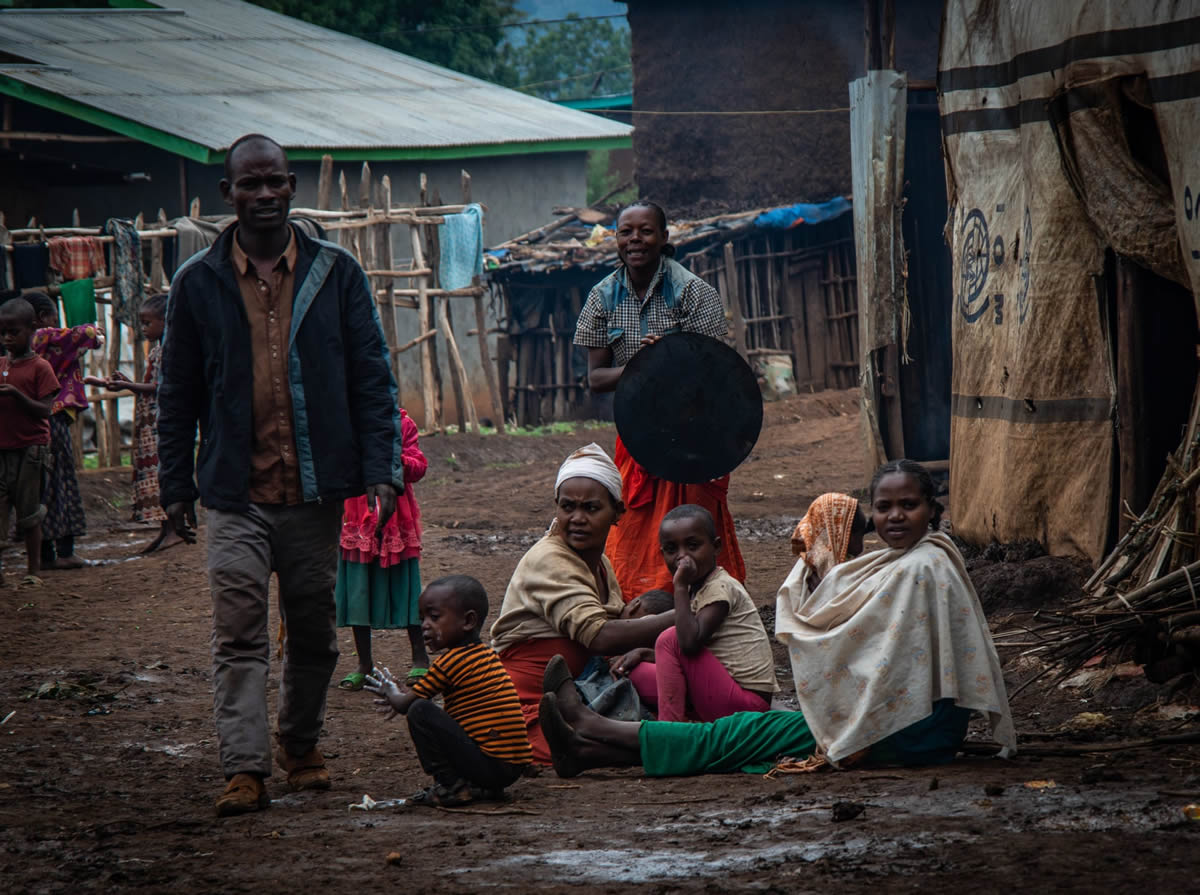In the rarely visited town of Gedeb, fears are rife over state plans to return 150 000 people to areas they fled because of ethnic violence.
Last week, a car rolled through the town of Gedeb in southern Ethiopia, flanked by federal police. A local official made an announcement to roughly 150 000 people who, displaced from their homes, have sought sanctuary in makeshift camps in the town and across the surrounding farmland.
In two days’ time, they were told through a loudspeaker, their shelters – mostly built of firewood, banana leaves and the odd tarpaulin sheet – would be demolished. Food aid, medical treatment and other humanitarian assistance would soon stop.
The announcement marked the start of the Ethiopian government’s latest effort to bring an end to a displacement crisis caused by ethnic violence that last year left about 2.9 million people homeless, according to new estimates. The figure, the highest recorded anywhere in the world, seriously mars the record of Abiy Ahmed, the reformist prime minister who took office in April 2018.
In the south, the worst affected area, an estimated 800 000 mostly ethnic Gedeos fled the district of West Guji in Oromia, the country’s largest region, between April and June. The International Organization for Migration calculated that nearly 700 000 of these people were still displaced as of 17 March this year.
According to a “strategic plan” seen by the Guardian, the government intends to return at least 800 000 people displaced around the country to their original homes by June. This includes all those sheltering in Gedeb and other parts of Gedeo zone, the vast majority of whom have repeatedly told aid workers and officials they are too afraid to go back.
At least 10 leaders of the displaced were arrested and briefly detained earlier in the month after speaking out against the plan. Local authorities have also cancelled two recent demonstrations planned in the Gedeo capital of Dilla.

“They raped our women and our girls, they burned our farms and our homes,” said Genet Asefa, 25, a mother of six, referring to the gangs of armed men that her and other Gedeos say chased them from West Guji last year.
Six months ago, Genet tried returning, only to find that her home had been destroyed – “there was nothing, only burnt ash” – and violent threats and harassment persisted. Not long after, she fled again.
“They are killing people,” she said. “The government wants us to return home – but we won’t go back until it is safe.”
Aid workers who spoke to the Guardian on condition of anonymity said the ongoing attempts to send internally displaced people (IDPs) from Gedeo back to West Guji constitute forced returns, breaching both the African Union’s Kampala convention – which Ethiopia has signed but still not ratified – as well as UN guidelines. According to these regulations, returns should be safe, voluntary, sustainable, and dignified.
On at least two occasions since last April the government has carried out what observers considered involuntary and premature returns to West Guji. Shortly after the second of these, in December, violence erupted and roughly 15 000 Gedeos fled anew.
“It is clear to us this a forced return again,” said one senior official with an international organisation working in the area. “No discussion about that.”
Another said: “When they say it is voluntary, it just means they are not forcing people with Kalashnikovs. But [the IDPs] feel they have no other choice.”
In early May, representatives of the humanitarian community sent a formal complaint to the government that its previous assurances – that those displaced between West Guji and Gedeo zone would not be included in the first phase of returns – had been broken.
Nonetheless, on 9 May public buses lined the road of Gedeb, waiting to convey people back to West Guji. Meanwhile, near a large camp around the town’s football field, a crowd congregated outside a gated compound, believed to be storing wheat and maize, to demand food handouts for the needy.
Though shelters and other facilities have still not been demolished as planned – at least in Gedeb – distribution of food aid has already stopped.
“The choice is this: if we go there we will be killed; if we stay here we will starve,” said Woinshet Woldemariam, a Gedeo woman. Her friend, Meserate Addisu, agreed, saying tearfully that she was still traumatised after witnessing the rape of two of her neighbours as they were chased from their homes last year.
She is not alone in fearing the perpetrators remain at large.
“The ones who murdered and raped were not arrested,” she said. “Still we are scared.”
In April, Abiy told reporters his administration had apprehended more than 300 people suspected of involvement in ethnic violence in Guji and Gedeo zones. Last week an official spokeswoman said it had identified 2 517 suspected perpetrators across the country, 1 300 of whom would face prosecution.
The government has not revealed further details such as the identity of the suspects, the specific location of the arrests, or the charges pressed.
IDPs have been told they will receive humanitarian support in West Guji, which the government says will include food, blankets, clothes, plastic sheets, mattresses and materials to rebuild their homes.
Only a few have accepted so far, but the numbers are growing. According to an official tally, 19 014 Gedeos arrived back in West Guji last week. More than 6 000 displaced Guji Oromos returned the other way.
A spokeswoman at the prime minister’s office said in early May that 875 000 IDPs nationwide had already been returned to their homes. Aid workers questioned that figure, however, reporting that very few who made the journey back to West Guji are yet to be living on their old properties. Most are sleeping in shelters like churches and warehouses.
According to the spokeswoman, the government is also continuing to support those in temporary shelters and is ensuring “basic necessities and humanitarian support and aid are appropriately distributed”.

She added that the response to the crisis adhered to “international best practices”, including the principle of voluntary action.
Some aid workers say this time the process began with more consultation with the humanitarian community, with comments and feedback invited from NGOs and donors.
Government requests for financial support for the process have been mostly unforthcoming, with donors complaining that Ethiopia’s plan lacks transparency and detail.
The anticipated speed of the returns has caused particular alarm among humanitarians. “Returning IDPs is a long and complex process,” said one. “It’s very dangerous to return such a large number of people in such a short timeline.”
Concern is not limited to the south. In western Oromia, more than 200 000 ethnic Oromos evicted from neighbouring Benishangul-Gumuz region last year also face government-pressured returns.
Humanitarian workers following the situation say the urgency is connected to the forthcoming planting season. Organisations working in the area report that certain forms of non-food assistance have been blocked since mid-February, and that some shelters have also been demolished.
This echoes the experience in Gedeo and Guji, where the government blocked almost all humanitarian assistance to IDP camps around Gedeb town for several months, as well as some other sites on the Guji side, contributing to acute malnutrition rates way above emergency thresholds and an unknown number of deaths. The blockade ended in mid-March, when Abiy made a well-publicised visit following a campaign on social media.
Even if most displaced Gedeos do return to West Guji this month, many problems remain. Despite recent high-level peace and reconciliation efforts, the Gedeo and Guji authorities still disagree on vital statistics.
According to Gedeo authorities, as many as 500 000 IDPs are expected to return to West Guji; their counterparts in West Guji, meanwhile, say they are expecting only 40 000.
This matters because an underlying reason for the conflict is land shortage, and anxieties among Guji Oromo residents about the size of the minority Gedeo population in the area. The last census, held in 2007, found 14% of the wider West Guji zone were Gedeo, and 79% Oromo.
Meanwhile, at a village level, relations are fraught and volatile.
Without sustained efforts to maintain law and order, ensure accountability and justice, and foster reconciliation, many fear a resumption of violence in the near future.
“If we go back the war will break out again after months, or even weeks,” said Genet.
This is an edited version of a feature originally published as part of The Guardian’s Global Development project.
Tom Gardner is a journalist based in Addis Ababa covering Ethiopia and the Horn of Africa

